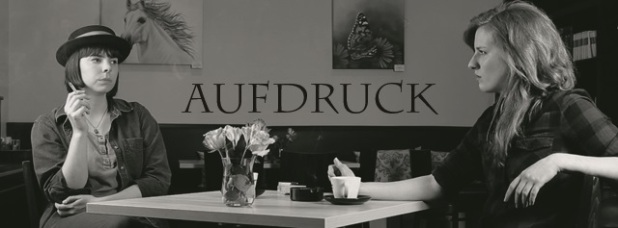What is the movie about? :: Beginning with a quote from Heimito von Doderer, the movie features two women, Pansen (Mary Krasnoperova) and Schluppe (Kira Mathis) who are having some talk about various things as they sit facing each other at a cafe. These two young women who are somewhere in their twenties will talk about anything under the sun, and the focus also remains on the cup of coffee and the cigarettes which they are having; they don’t seem to ever end up with enough of these and they are of the opinion that people should be better. They don’t seem happy at all with what happens around them, and have that kind of opinions which are not just strange, but also too direct and won’t be really acceptable to many.
So what are the points of discussion about? :: The exact translation of AUFDRUCK is “label”, and LABEL is also the English title of the fourth short-film directed by Jaschar L Marktanner, who have taken six films so far; this is also his first work as an editor. Each dialogue in the movie reminds us of the labels, the symbols of those miserable conclusions that the society come across related to what we do; something which is often declared by our own relatives themselves. A “label” is something from which there is no escape, as it has been pasted on us with so much ease, as the repetitive words work as the glue. There are times when we wonder if the society had already made a decision on us when we were little kids; sometimes we feel that the relatives always knew what to label us according to certain factors which we know nothing about. It is really difficult to get rid of the labels.
Soul exploration :: The movie is shot in black and white, except for the little colour in the end, and there is a certain piano sound playing on the background. The subtitles are in colour though. The language used won’t go on well with everyone, especially a lot of people from this part of the world. But it can be seen a reflection of the new generation types which we see all around these days. Even around here, we can see such abusive language being used in local languages throughout the social media. It has become part of our lives, and people just randomly use it against people whom they don’t like. The two lady characters in the video are reflections of such people who can do nothing much other than being disrespectful and abusive to the strangers about whom they come up with random opinions in a negative way. The funny thing here is that they even brand the aliens!
More soul exploration :: Such opinions which become nothing less than labels, are put upon people based on just random thoughts. It is clear from the opinion about waitress job that is said with such clarity and confidence that it will make one wonder how people can so easily have a personal opinion regarding people just based on their jobs. The case of dignity of labour is still not there, even after so many years of modernity, and even with the teaching in schools that no job inferior. The teachings of Mahatma Gandhi, the father of our nation, never really maintain any influence on most of our countrymen as we have a look around and see how the labels fly and how some people are mistreated. The class divide has only increased with the new millionaires, and so many people still living below the poverty live a miserable life.
Further soul exploration :: If it is looked at directly from the point of view of a common man here, the points are that the two things here coffee and cigarettes have been considered as more of the capitalist matter. The replacement for cigarettes have been beedis, which were the common man’s cigarette for quite a long time, and has had a relationship with the socialist and communist movements here. Nationalists also used to support beedi in favour of the home-made products. The situation is even more radical in the case of tea. Coffee became popular here because of the IT companies and call centres which have the machines offering free coffee to which the professionals are addicted. The common man’s drink has always been tea, as it remains the cheapest available drink in the country.
And a little more about it :: Tea has been considered the socialist drink, and the communist parties here have used them through the ages, with some movies featuring the same providing tea with the title of being the drink of the masses. Tea still remains the most consumed drink here, and is also the national drink. India’s ruling nationalist party, Bharatiya Janata Party (BJP) has also successfully used tea as part of its campaign, with “conversation over tea” idea for the common man. So, the idea of having coffee and cigarettes and being abusive towards the working class is a symbol of the class divide which has been widening, with the rich getting richer and the poor getting poorer. The poor gets the labels put on them by the rich and the successful people – even the parents of the successful men and women comes up with such labels, don’t they?
How it finishes :: But these people who belong to the higher class can actually act very well, and they will pretend to be good. They can hide their contempt as much whenever they want to because they are trained to pretend. They will just blame the society which consists of the working class, and as they are the more influential ones in the society, this society will take over the labels which these people create, and paste them right on the common man. When they see people who are different, they are even quicker to come up with the labels; it is the depressing state of our society. It has the first leading role for Kira Mathis and the first role for Mary Krasnoperova, and the two ladies have done some excellent job in reflecting the true nature of the society – the latter is my favourite here. It is an interesting work from Jaschar L Marktanner, which will work for you depending on how you think about it, and what you decide to take from it. I consider this flick as a representation of the class divide and the basic human contempt/vanity that leads to labeling others. You will also see the reflections of the online trolls and abusers who do nothing, but keep talking in an abusive tone. The message here which you can take home is to stop judging people, especially based on money and job! If you get deeper into it, you will want this short-film to be at least a little bit longer. You can watch the trailer of the short-film below, and the full movie will be available online soon.
Release date: 10th October 2014
Running time: 4 minutes
Directed by: Jaschar L Marktanner
Starring: Mary Krasnoperova, Kira Mathis, Steffi Charlotte Fluri, Jaschar L Marktanner
@ Cemetery Watch
✠ The Vampire Bat.


